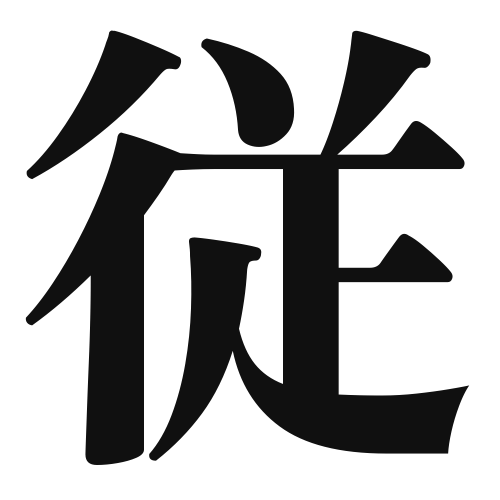1. Overview of Meaning
The kanji “従” (pronounced “juu” or “shuu”) generally means “to follow” or “to obey.” It conveys the idea of compliance or adherence to rules, instructions, or authority.
2. Formation and Radical
Formation of the Kanji: The kanji “従” is a compound character (会意文字) that combines the radical for “to walk” (行) and the character “to follow” (従). This illustrates the concept of following someone or something.
Radical: The radical of “従” is “行” (to walk), which relates to movement and following.
3. Examples of Usage
Common Words and Phrases:
- 従う (したがう, shitagau) – to follow, to obey
- 従業員 (じゅうぎょういん, juugyouin) – employee
Example Sentences in Daily Conversation:
- 彼は上司の指示に従った。 (かれはじょうしのしじにしたがった。) – He followed his boss’s instructions.
- 私たちはルールに従う必要があります。 (わたしたちはるーるにしたがうひつようがあります。) – We need to follow the rules.
4. Synonyms and Antonyms
Similar Kanji:
- 服 (ふく, fuku) – to obey, which emphasizes submission.
- 従属 (じゅうぞく, juuzoku) – subordination, which indicates a hierarchical relationship.
Antonyms:
- 反抗 (はんこう, hankou) – rebellion, which means to resist or oppose authority.
- 自由 (じゆう, jiyuu) – freedom, which implies independence and lack of constraints.
5. Cultural and Historical Background
Relation to Japanese Culture: The concept of “従” is deeply rooted in Japanese culture, where respect for authority and harmony in relationships are highly valued. Following rules and traditions is often seen as a virtue.
Proverbs and Idioms:
- 従う者は幸せになる (したがうものはしあわせになる) – Those who follow will find happiness, emphasizing the benefits of obedience.
